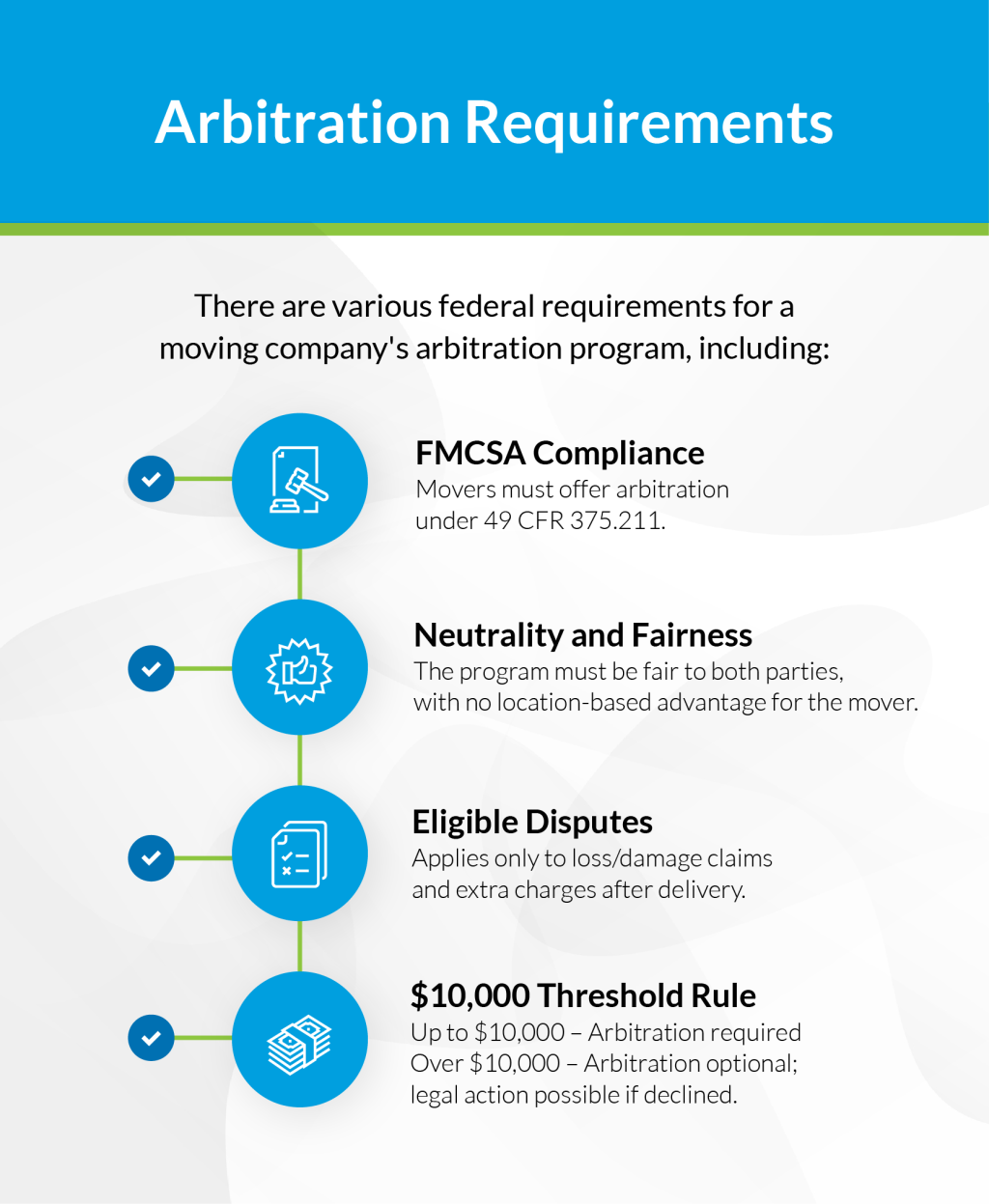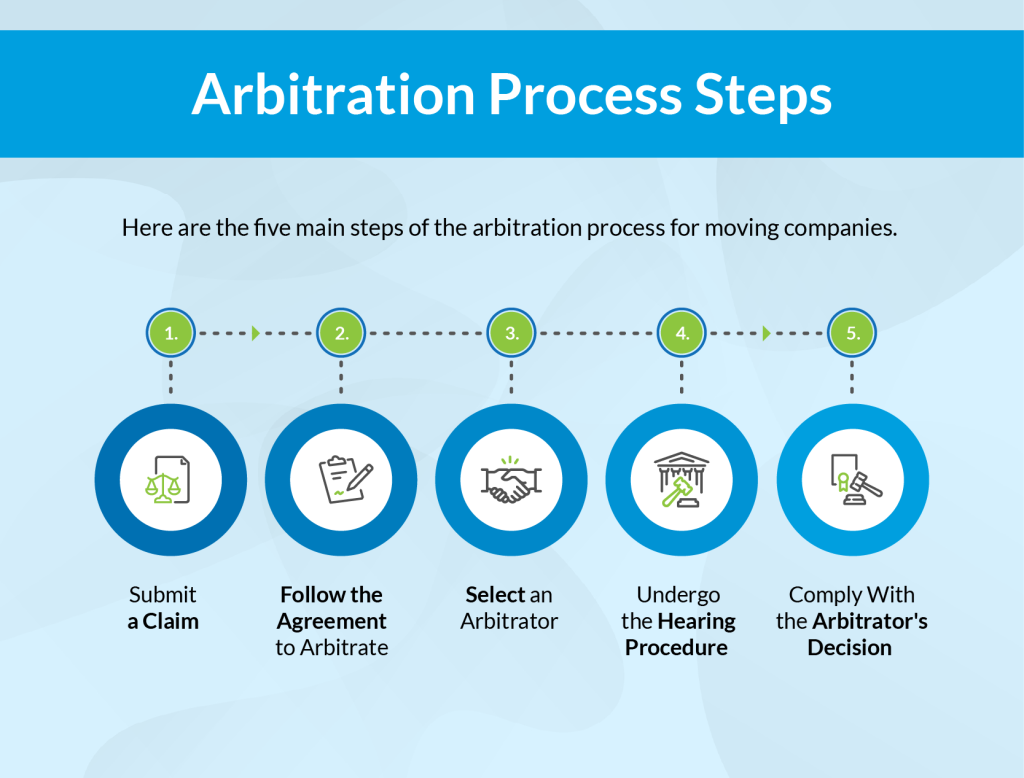
How moving companies can satisfy arbitration requirements
How moving companies can satisfy arbitration requirements
If you have or are starting an interstate household goods moving company, it is essential to offer an arbitration program to all customers. Doing so may help your business resolve disputes fairly and build trust with potential shippers.
What is arbitration, and how does it work for small businesses? This comprehensive guide from Business Consumer Alliance explores the answers to these common questions, plus discusses whether it is a legal requirement, why it is important, and what this process will look like.
What Is Arbitration for Movers?
Arbitration is a means of resolving disputes through a binding contract. During this process, both sides of the dispute present their side to a neutral third party, who decides what the outcome should be. The third party's decision is typically final and binding. To determine the outcome, the third party will consider the evidence provided and choose a solution they feel is fair.
Arbitration includes a hearing, which is like a court proceeding but more informal. While an attorney is not required at these hearings, you may bring one or consult one before the hearing. The arbitration proceeding will generally conclude within 90 days. Businesses often create agreements with their consumers to arbitrate disputes that occur during the business transaction.
Is Arbitration Legally Required for Moving Companies?
Yes, arbitration is a requirement for moving companies before they begin conducting business. You must have an active mover's arbitration in your individual Department of Transport (DOT) classification. Customers should be able to view your company's arbitration certificate in plain sight at your company's corporate headquarters. Your arbitration program should also be renewed each year.
Can a Mover Be at Risk Without Arbitration?
Your moving company may be at risk of a violation if you are operating without arbitration in place. The law especially requires arbitration when transporting household goods across state lines. If you are being inspected or audited and do not have arbitration, you may want to implement arbitration right away.
Arbitration became a requirement to decrease cases involving moving companies in the U.S. court systems. Some judges may also dismiss cases involving moving companies when they see that the consumer did not have the option of arbitration before going to court.
What Is the Importance of an Arbitration Program for Movers?
An arbitration program is a system an interstate household goods mover has in place to manage potential disputes with customers. An effective arbitration program provides a fair, cost-effective, and efficient means of resolving disputes between moving companies and customers.
This program protects customers by neutrally addressing issues and safeguards the business's reputation when demonstrating a commitment to fair practices. Arbitration programs can help enhance consumer trust, satisfaction, and confidence.
Benefits of Properly Implemented Arbitration Programs
An effective arbitration program comes with numerous benefits, such as:
- Faster dispute resolution: Arbitration proceedings are typically faster than court trials. Arbitrators can resolve disputes within weeks or months.
- Cost savings: Arbitration costs less than litigation due to reduced legal fees, faster resolution times, and streamlined procedures.
- Business and consumer protection: A well-designed arbitration program is fair and impartial when resolving disputes, which protects the rights of moving companies and their customers.
- Enhanced consumer trust and confidence: Reliable and accessible arbitration programs allow moving companies to show clients their commitment to building trust and customer satisfaction. Ensuring consumers are aware can increase positive word-of-mouth referrals and customer loyalty.
What Are the Arbitration Requirements?
There are various federal requirements for a moving company's arbitration program, including:

- Federal Motor Carrier Safety Administration (FMCSA): The FMCSA requires all interstate household goods movers to offer consumers an arbitration program under regulation 49 CFR 375.211.
- Neutrality and fairness: Your arbitration program should be neutral and fair to the mover and consumer. For example, the mover should not have any advantage because the consumer lives far from the mover's main place of business.
- Types of eligible disputes: Arbitration programs should only cover disputes concerning loss and damage claims for household goods and additional charges billed to the customer after delivery.
- The $10,000 threshold rule: If the customer or shipper has a claim of $10,000 or less, the mover is responsible for allowing the customer access to their arbitration program. If the claim exceeds $10,000, the customer will need to submit a request for arbitration. The mover can either agree or refuse to participate. The customer may then decide to take legal action instead.
Essential Components of a Complaint Arbitration Program
When implementing an arbitration program, ensure it has the following components.
Neutral Arbitration Procedures
Your arbitration program should be neutral and impartial. It should include procedures that ensure fairness to both parties. The location of the arbitration should also be convenient for the customer or determined by a neutral third party.
Pre-Move Disclosure Requirements
As a moving company, you should disclose that your customers have access to arbitration before the moving process. The disclosure can be included in the moving contract or another relevant document. The information provided could include a summary of the arbitration process, applicable costs, and a disclosure of the legal effects of using arbitration.
Information and Forms for Initiation
Moving companies should provide customers with clear and easy-to-understand information about how to initiate arbitration. This process includes offering the necessary forms and contact information for initiating an action to resolve a dispute under arbitration.
Independent and Qualified Arbitrators
Arbitrators must be independent, impartial, and qualified to handle disputes in the moving industry. They should have experience in contract law, transportation law, and dispute resolution. The arbitrator should be able to obtain information and any relevant materials from the mover or individual shipper to make a fair decision.
Fair Cost-Sharing Structures
Arbitration costs should be shared fairly between the moving company and the customer. The arbitrator will generally determine the percentage of payment for each party. Even so, the individual shipper should not pay more than half of the arbitrator's cost. Clearly outline the cost-sharing arrangement in the arbitration agreement.
Voluntary Customer Participation
While you are required to offer arbitration as a moving company, your customers should voluntarily agree to participate in the process. Similarly, you cannot make the customer use arbitration before a dispute arises.
Binding Decisions and Time Frames
The arbitrator's decision should be binding on both parties. However, moving companies and their customers still have limited grounds for appeal. The arbitration process should also be completed within a reasonable time frame, typically within 60 days of receipt of the written notification of the dispute. The 60-day period may be extended if one party is unable to provide information promptly.
Documentation and Communication Protocols
Moving companies should maintain thorough documentation of all arbitration proceedings and communicate effectively with customers throughout the process. Doing so ensures a smooth process and prevents the chance of delays.
What Is the Arbitration Process for Moving Companies?
Here are the five main steps of the arbitration process for moving companies.

1. Submit a Claim
The moving company or the customer can initiate arbitration by submitting a claim to the company's designated arbitration program provider. The arbitration provider will then prepare a Demand for Arbitration for the initiator and send it to the other party. This party will then have the opportunity to describe their side of the dispute, how they would like the dispute to be resolved, and an ideal settlement offer. Both parties must agree to arbitrate for the arbitration process to continue.
2. Follow the Agreement to Arbitrate
The arbitration provider will prepare an Agreement to Arbitrate document that outlines the issues to be decided and the types of awards the arbitrator should consider in the case. If you disagree with the description or potential outcomes outlined, you can speak with your provider to correct the issue.
Both parties will then sign and return the Agreement to Arbitrate within a specified timeline. If you and your customers agree to arbitrate in advance, it may be considered an acceptance of the agreement.
3. Select an Arbitrator
Depending on your arbitration provider, you may work with a variety of qualified and trained arbitrators. An arbitrator will be assigned to each case according to the nature of the dispute and the arbitrator's availability. Once the provider assigns an arbitrator, you may receive a Notice of Hearing, which may include the arbitrator's name and brief biography.
If either party has a present or past relationship with the arbitrator, you may reject the arbitrator and appoint another one.
4. Undergo the Hearing Procedure
Your arbitration provider will schedule an arbitration hearing based on both parties' convenience and availability. The hearing can take place via videoconferencing or writing. Here, you'll need to provide evidence and arguments that support your statements. Some examples of evidence include a contract, bills, documents, receipts, or correspondence that support your claim. The arbitrator will carefully consider both sides before making their decision.
5. Comply With the Arbitrator's Decision
After the hearing, the arbitrator will make a decision and decide on the award. No more arguments or evidence may be presented after this point, and both parties will be expected to comply with the final decision. Arbitration awards may include refunds of the cost of the product or service related to the dispute, reimbursement, repairs, or compensation for out-of-pocket property damage or loss costs. Both parties will receive a copy of the written decision and the arbitrator's reasons for the decision.
How to Avoid Common Pitfalls
Here are the common pitfalls of arbitration for movers and how to avoid them:
- Inadequate disclosure to customers: When you fail to clearly disclose the arbitration agreement to customers, you may lose potential customers or have problems when trying to pursue arbitration. To avoid this issue, ensure the arbitration clause is prominently displayed in the contract, written in plain language and acknowledged by the customer with a signature.
- Biased arbitration processes: Avoid using an arbitration provider who is not independent or whose procedures favor the moving company. Customers may notice this pattern, causing you to lose consumers. Partner with a neutral and reputable arbitration provider with a track record of impartiality.
- Delayed resolutions: Allowing the arbitration process to drag on unnecessarily can frustrate customers and undermine its benefits. You can avoid this issue by establishing clear timelines for each stage of the arbitration process and diligently following these timelines.
- Noncompliance with federal regulations: There may be consequences when you fail to meet the requirements of FMCSA regulations regarding arbitration programs. Ensure that your moving company stays up to date on the latest regulations. You may also work with a legal professional to help you maintain compliance.
- Failure to honor arbitration awards: Refusing to comply with the arbitrator's decision may undermine the integrity of the arbitration process. Treat arbitration awards as binding and ensure you comply with them fully and promptly.
How to Implement Arbitration Into Business Operations
If you are just starting your moving business, here is a quick guide to integrating arbitration into your business operations:
- Update contracts and customer agreements: Review and update your customer agreements and contracts to ensure they include a clear and compliant arbitration clause.
- Develop internal dispute handling protocols: Develop internal protocols for handling customer complaints and disputes, including procedures for initiating arbitration.
- Train staff on arbitration processes: Inform your staff about the company's arbitration policy. Provide training on the correct procedures and ways to communicate effectively with customers and handle disputes.
- Maintain proper documentation: To stay organized and prevent complex issues, maintain thorough and accurate records of all moves, including contracts, damage reports, inventories, and communications with customers.
- Inform customers about arbitration: Proactively inform customers about the availability of arbitration to resolve disputes and the benefits of this solution to customers. Make sure the disclosures are clear, concise, and compliant with the relevant regulations.
Arbitration, while a requirement for moving companies, is an excellent way to gain consumer trust and safeguard your company's reputation as a business committed to fair dispute resolution. It allows you to improve customer satisfaction and loyalty. These positive customer experiences translate into positive online reviews and improved business ratings, as customers feel protected and know that your company holds itself accountable. These results are possible when implementing a fair and neutral arbitration program.
This story was produced by Business Consumer Alliance and reviewed and distributed by Stacker.



